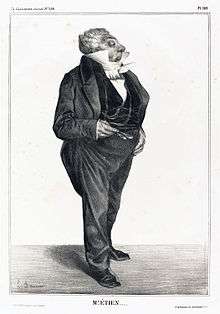Charles-Guillaume Étienne


Charles-Guillaume Étienne (5 January 1778 – 13 March 1845) was a French dramatist and miscellaneous writer.
He was born in Chamouilley, Haute Marne. He held various municipal offices under the Revolution and came in 1793 to Paris, where he produced his first opera, Le Rêve, in 1799, in collaboration with Antoine-Frédéric Gresnick. Although Étienne continued to write for the Paris theatres for twenty years from that date, he is remembered chiefly as the author of one comedy, which excited considerable controversy. Les Deux Gendres was represented at the Théâtre Français on 11 August 1810, and procured for its author a seat in the Académie française.
A rumour was put in circulation that Étienne had drawn largely on a manuscript play in the imperial library, entitled Conaxa, ou les gendres dupes. His rivals were not slow to take up the charge of plagiarism, to which Étienne replied that the story was an old one (it existed in an old French fabliaus) and had already been treated by Alexis Piron in Les Fils ingrats.
He was, however, driven later to make admissions which at least showed a certain lack of candour. The bitterness of the attacks made on him was no doubt in part due to his position as editor-in-chief of the official Journal de l'Empire. His next play, L'Intrigante (1812), hardly maintained the high level of Les Deux Gendres; the patriotic opera L'Oriflamme and his lyric masterpiece Joconde date from 1814.
Étienne had been secretary to Hugues-Bernard Maret, Duc de Bassano, and in this capacity had accompanied Napoleon throughout his campaigns in Italy, Germany, Austria and Poland. During these journeys he produced one of his best pieces, Brueys et Palaprat (1807). During the Restoration Étienne was an active member of the opposition. He was seven times returned as deputy for the département of Meuse, and was in full sympathy with the revolution of 1830, but the reforms actually carried out did not fulfil his expectations, and he gradually retired from public life. Among his other plays may be noted: Les Deux Mères, Le Pacha de Suresnes, and La Petite Ecole des pres, all produced in 1802, in collaboration with his friend Gaugiran de Nanteuil (1778–1830).
With Alphonse Dieudonné Martainville (1779–1830) he wrote an Histoire du Théâtre Français (5 vols, 1802) during the revolutionary period. Étienne was a bitter opponent of the romanticists, one of whom, Alfred de Vigny, was his successor and panegyrist in the Academy. He was an Officer in the Legion of Honor, and was buried in the Père Lachaise Cemetery in Paris.[1]
His Œuvres (6 vols, 1846–1853) contain a notice of the author by L Thiess.
Notable Contribution: In Bruis et Palaprat, Étienne penned the phrase, "On n'est jamais servi si bien que par soi-même.", which has widely been translated as, "If you want something done right, do it yourself.", although the literal translation is, "One is never served so well as by oneself.".[2][3]
References
-
 This article incorporates text from a publication now in the public domain: Chisholm, Hugh, ed. (1911). Encyclopædia Britannica (11th ed.). Cambridge University Press.
This article incorporates text from a publication now in the public domain: Chisholm, Hugh, ed. (1911). Encyclopædia Britannica (11th ed.). Cambridge University Press.
| ||||||
| ||||||
|